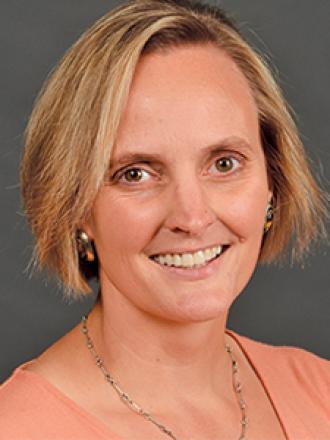‘It’s not just a set of skills, but an identity’: Professor researches bilingualism at elementary
By Elena Meadows
College of Arts and Sciences staff writer
Dr. Kristina Wirtz, professor of Spanish at Western Michigan University, has spent two years doing research listening to how children at Kalamazoo Public Schools’ bilingual elementary, El Sol, use English and Spanish throughout their school day.
The school offers a unique opportunity for her to do so as teachers present the subjects of language arts and social studies in English, and the subjects of math and science in Spanish.
Starting with kindergarteners who are now in second grade, she attended their classes, recess and lunch, taking note of how they use the language.
“It’s not just a set of skills, but an identity,” she said.
The children come from different backgrounds — some already speak both languages, some only one.
She finds those that are English monolingual tend to answer Spanish questions in English, however, that indicates that they understood what the teacher was asking.
Those who speak Spanish at home are much more likely to accommodate to English during class time — but when it comes to socialization, they revert to their native tongue.
“If you and I were to walk into a Spanish classroom I guarantee we’d be hearing English as well as Spanish,” she said. On the other hand, a visit to an English classroom would have some Spanish being spoken along with the English.
“How it’s all patterned is what I’m observing,” she said.
She has found that despite the teacher giving directions and the students reading problems in Spanish, as soon as they try to negotiate the answers, “most of the time they switch to English.”
“These are all little nuances that tell us the attitudes kids develop about language in homes, neighborhoods and societies,” she said.
The children do learn to read in English and Spanish, and “when they leave, they are really good in both languages,” she said.
Wirtz finds that skills in areas such as mathematics are easily transferable between languages, and El Sol’s teachers encourage such “bridging.”
“It helps the bilingual mind develop,” she said.
In the first year of Wirtz’s project, she received two grants from two foundations. This year she received a research grant from Western Michigan University. She continues to work with the students, now in third grade.
Upcoming event
Dr. Kristina Wirtz will be presenting on “Conjuring Spirits, Crossing the Waters: An AfroCaribbean Historical Journey” at the Kalamazoo Institute of Arts, 314 S. Park St., on Sept. 29 from 6:30 to 8 p.m.
Her program is in conjunction with “Renée Stout: ‘Tales of the Conjure Woman,’” a display that will remain at the KIA through Oct. 23.
The Caribbean as a crucible of the African Diaspora has long been in dialogue with the rest of African America. Wirtz has done long-term research on folk religion in Cuba.


